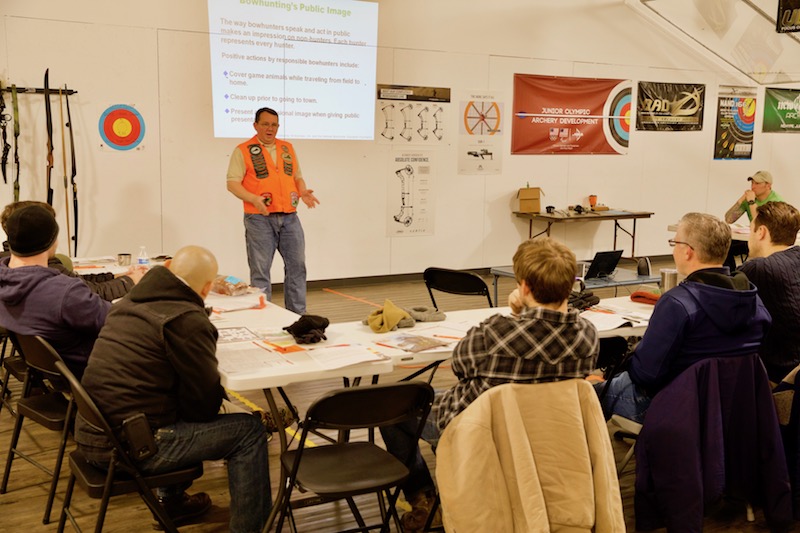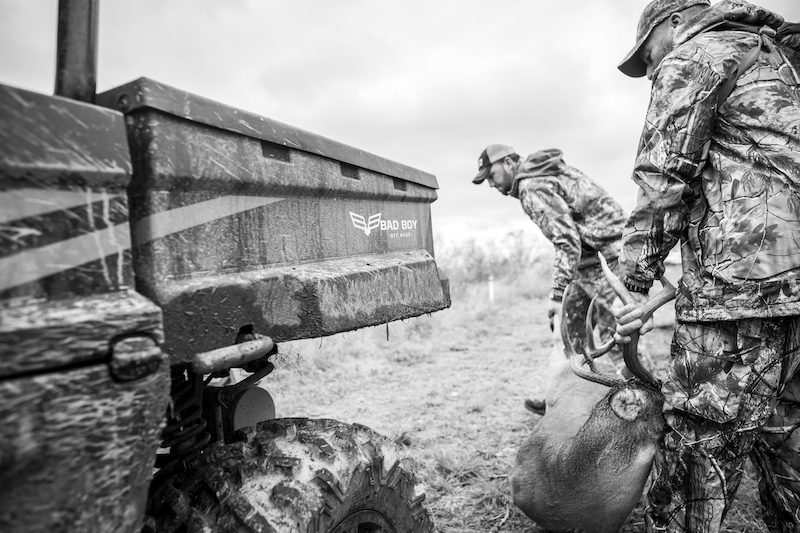A hunting license is essentially your ticket to arrow deer, obtain meat, and make memories. However, shooting game species without a valid hunting license is illegal. Be a smart, ethical, and responsible bowhunter by buying a hunting license every year. It’s the law.
Most state wildlife agencies let hunters buy licenses online. Hunters can then print the license at home or request to receive it by mail. (You can also buy your licenses at some archery shops or other licensing agents.) Follow these steps to obtain your license and unlock the door to multiple hunting opportunities.

Pass a bowhunting safety course to make sure you’re safe in the woods before you get your license. Photo Credit: ATA
To buy a bowhunting license, most states require you to pass a hunter or bowhunter education course. These hunter safety courses teach you about safety, hunting tactics, hunting laws, shot placement, blood trailing, field care, and equipment needs. They’re a great place to learn about hunting before you go.
After passing your hunter safety course, you’ll get a certification card with a unique ID number. This number proves you’ve completed the course; you will need your ID to buy a hunting license.
Many states also offer some form of an apprentice hunting license, which are “trail” licenses where the participant can hunt without completing a hunter safety course. However, according to the Congressional Sportsmen’s Foundation, youth and adult novice hunters using the apprentice license must hunt under the supervision of a licensed hunter. This approach encourages potential hunters to try hunting, and gain knowledge and hands-on experience, before taking a hunter education course.
Check your state wildlife agency’s website for prerequisite information and to learn about license options.
Next, visit your state wildlife agency’s website for licensing information. The U.S. Fish and Wildlife Service has a list of state websites, with links to multiple state departments. Each department handles different operations, so you must find the one that sells hunting licenses. Click the one that uses words like “game,” “wildlife” or “natural resources.” These departments oversee wild animals, and set harvest limits and hunting regulations to ensure wildlife populations stay in check. Learn more here.
For example, under Massachusetts you’ll find three departments, including the Massachusetts Department of Conservation and Recreation, the Massachusetts Department of Environmental Protection, and the Massachusetts Department of Fish and Game. The fish and game agency handles the state’s hunting licenses.
Other examples include the Texas Parks and Wildlife, Idaho Department of Fish and Game, or Colorado Department of Natural Resources.
Once you’ve found your state agency website, find the section titled “Buy a License,” or similar words. If you don’t see “license” anywhere, click or search “hunting” or related terminology to get on the right track.
Many state wildlife agency websites are intuitive once you’re familiar with the format and layout. Be patient and poke around until you find the right area. If you’re having trouble, ask a hunting mentor or someone at an archery store for help.

Assess your needs/what you’ll be hunting before buying the license. Photo Credit: ATA
This step is a bit tricky, but if you carefully read descriptions, you can often determine what you need. Here are a few things to consider:
Let’s review by using “Jane Doe from Georgia” as an example. Jane is 27 and wants to hunt on private and public land in Georgia year-round. After reviewing the license options in Georgia, Jane realizes she doesn’t qualify for a youth, senior or nonresident license. Georgia doesn’t require a special WMA permit to hunt public land, but it does require hunters to carry a harvest record. Therefore, she’ll purchase an annual big-game license (or “sportsmen’s license” if she wants to fish, too) with a harvest record.
License prices vary by state. Expect to pay more than residents if you’re a nonresident. Bowhunting some species requires special draw tags, which usually have quotas and application deadlines. Click here to learn more.
Also, if you’re ready to make hunting a lifelong passion, consider buying a “Lifetime License.” Most states offer lifetime licenses that allow you to buy full-privilege sportsman’s licenses for a one-time price. They’re pricey upfront but save you money in the long run, especially if you hunt every year.
If you’re unsure of which license you need, call your state agency and talk to a representative. Explain your situation and goals, and they’ll help you determine the best license for you.
Once you’ve found the licenses you want to buy, add them to your cart and begin the checkout process. Some state agencies require you to create an account with a user name and password. You’ll need the information you gathered in Step 1, as well as your address, email address, phone number, date of birth, social security number, and other personal information.
Your hunting license identifies who you are and what hunting or fishing permissions you have/bought. Conservation officers will check your hunting license much like police offers check driver’s licenses.
Once you check out and pay, print your license or have it sent to you by mail. Sign it and carry it with you at all times when bowhunting. It serves as your “get out of jail free card” should you get stopped by a game warden, assuming you’re abiding by all other state regulations.

Your license will contribute to conservation. Photo Credit: John Hafner
Hunting licenses give you the power to hunt legally, but they also generate funds for states’ conservation efforts, such as wildlife research, habitat restoration projects, and public access programs. How? Each time someone buys a hunting license, that money goes to the state agency selling the license.
Agencies rely primarily on two funding sources – hunting and fishing license fees; and federal excise taxes paid on firearms, ammunition, fishing tackle and archery gear. Few agencies receive funding from general taxpayers. Therefore, the revenues collected ensure our nation’s fish and wildlife remain healthy, abundant, and available to hunters and anglers. You can feel good about buying licenses. In fact, encourage your friends to buy licenses even if they don’t plan to hunt or fish. Agencies benefit from all financial contributions.
Learn more about the “user-pay, user-benefit model” in Bowhunting 360’s article “What Fuels Conservation? Bowhunters Like You.”
Lastly, if you harvest an animal with your license, most states require you to report the harvest to agency staff. You’ll likely need your license ID number, the county where you harvested the animal, and information about the deer, including sex, approximate weight and the number of antlers. Read your agency’s website for reporting guidelines and methods. State agencies collect this information so they can watch population numbers and make science-based decisions regarding future bag limits. Keep this in mind throughout the hunting season.